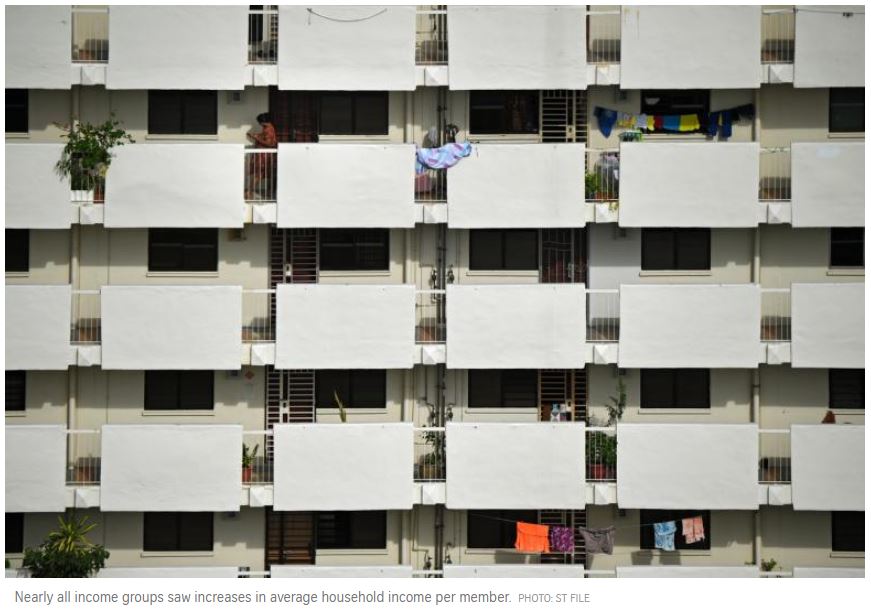Household incomes rose in 2021 to above pre-Covid levels as Singapore economy recovered
SINGAPORE – The median household income grew last year in tandem with Singapore’s economic recovery from the Covid-19 pandemic, after it had fallen in 2020 for the first time in a decade, according to new figures released by the Singapore Department of Statistics (SingStat) on Tuesday (Feb 15).
Last year, the median household income from work rose by 3.6 per cent in nominal terms, or before adjusting for inflation, to $9,520, from $9,189 in 2020 – surpassing pre-pandemic levels. After taking into account inflation, this works out to a 1.5 per cent increase in real terms.
The household income from work includes employer Central Provident Fund contributions.
Nearly all income groups saw increases in average household income per member, except for top earners, who saw a 1.1 per cent drop in real income.
Meanwhile, household income inequality fell to the second-lowest since 2000, after accounting for Government transfers and taxes. It had hit an all-time low in 2020 with massive Covid-19 reliefs.
Median household income rebounded
The median monthly household income increased last year, after it dropped by 2.4 per cent in real terms in 2020, as Singapore struggled to cope with the pandemic.
Last year’s household income even exceeded pre-pandemic levels. Total household income stood at $9,425 in 2019, before falling to $9,189 in 2020 and rebounding to $9,520 last year.
Taking into account household size, the median monthly household income from work per household member rose from $2,886 in 2020 to $3,027 in 2021.
The median monthly household income also increased over the past 10 years, SingStat noted.
From 2011 to 2016, median monthly household income from work rose by 16.9 per cent cumulatively.
But this growth slowed from 2016 to 2021, with real growth coming in at 4.2 per cent cumulatively.
All but top earners see real incomes rise
All resident employed households were ranked from the lowest to the highest based on their monthly household income from work per household member and broken down into 10 groups, or deciles.
Last year, nine deciles saw real income growth of 0.6 to 5.5 per cent.
But those in the top 10 per cent income group saw an income drop instead.
SingStat said in its report that this was because the income of residents employed as legislators, administrators and managers fell.
More than 40 per cent of employed residents in the top decile were employed in these occupations, it added.
“The real household income growth for this group was further dampened by higher inflation in 2021,” SingStat said.
Income inequality fell
Household income inequality last year was the second-lowest since 2000, after accounting for Government transfers and taxes.
Income inequality is measured by the Gini coefficient. A Gini coefficient equal to zero occurs when there is total income equality, and it hits one when there is total inequality.
Singapore’s Gini coefficient based on household income per household member was 0.444 in 2021, lower than the 0.452 observed in 2019 and 2020, SingStat said.
After adjusting for Government transfers and taxes, the Gini coefficient in 2021 fell to 0.386.
Nonetheless, this was still an increase from the Gini coefficient of 0.375 in 2020, which was the lowest on record.
This is due to the cessation of one-off schemes introduced in 2020 to cushion the impact of the Covid-19 pandemic, SingStat added.
Government transfers dropped in 2021
Households continued to receive a significant amount of Government transfers last year, although this was a smaller figure compared with 2020, as one-off schemes tapered off.
Resident households, including those with no employed people, received $5,096 per household member on average from various Government schemes in 2021.
This was less than the $6,324 received in 2020.
Those staying in one-room and two-room Housing Board flats continued to get the most Government transfers, SingStat said.
Last year, these households received $11,363 per household member on average from Government schemes, more than double the amount received by those living in three-room HDB flats.
Source: https://www.straitstimes.com/singapore/household-incomes-grew-in-2021-as-singapore-economy-recovered-from-covid-19


 Thailand
Thailand




